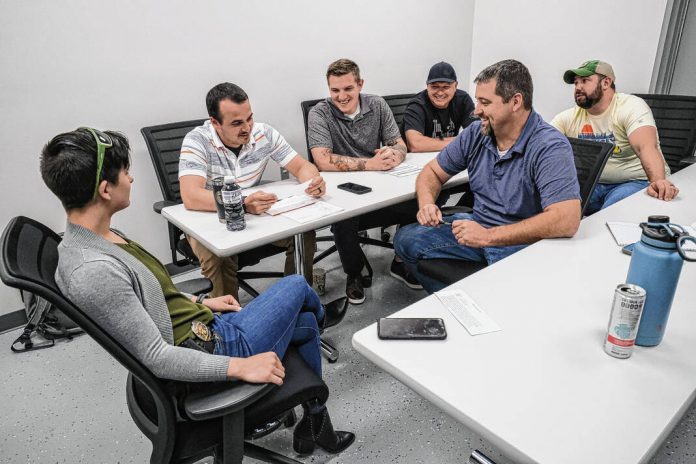
Mike Wolanin | The Republic Columbus Police officers Chelcie Ragsdale, from left, Tony Summer, Andrew Plank, Branch Schrader, Toby Combest and Casey Kendrick look over a clue during a training session on tracking down and locating missing children at Evolution Training Center in Columbus, Ind., Wednesday, May 10, 2023.
Local law enforcement officials are building a team of officers and deputies who have undergone specialized training on how to respond to a parent’s worst nightmare — missing and abducted children.
About 20 law enforcement officials from the Columbus Police Department and Bartholomew County Sheriff’s Department took part in a two-day training recently covering skills, techniques and resources that can help them locate missing children quickly and bring them back safely.
The two-day training, which has been conducted annually since 2021, seeks to teach officers the fundamentals of implementing an effective responsive to a report of a missing or abducted child and includes real-life case studies and table-top scenarios in which officers worked theoretically through an abducted child case.
The officers who completed the training have joined the growing ranks of CPD’s Child Abduction Response Team, which is a group of law enforcement officials seeking to ensure a rapid and comprehensive response to a report of a missing or abducted child, officials said. These officers would be alerted in the event of such an incident.
So far, more than 40 local law enforcement officials have undergone the training, including all school resource officers, detectives and supervisors, said Sgt. Courtney Plummer of the Columbus Police Department, who is co-coordinator of CPD’s Child Abduction Response Team, or CART, and who helped lead the training.
“The safety of our kids is a top priority for all of us,” Plummer said. “Preparing and planning for that is essential. …We want to be as proactive as we can on the front end of things in preparing for an incident so we’re operational as quickly as possible after we’re being called out, because the rapid deployment of the team and any resources we have is crucial for a successful outcome.”
CART teams
Formal CART teams have become more common across the country over the past couple decades, said Detective Sgt. Matt Martindale of the Columbus Police Department, who is co-coordinator of CPD’s Child Abduction Response Team and also helped lead the training.
CPD began to become interested in CART training in 2019 and 2020, when Plummer and Martindale started attending training by the National Criminal Justice Training Center and Federal Bureau of Investigation.
The COVID-19 pandemic, however, slowed down the implementation of the team, said Martindale, who added that there has been no shortage of officers who are interested in the CART training.
“The bigger CART teams, like the original one out in Arizona is the entire northern part of the state, departments from Phoenix on up, every sheriff’s department,” Martindale said. “…We haven’t gotten that big yet, but we figure we’d start with our ground level and train our own officers in it and see where we go from there.”
Martindale said he was unsure how often CPD receives calls about missing children but said the most common call CPD receives involving missing children is for children who have run away from home.
The most recent case of a missing child occurred on Monday, when Columbus police sent out an alert seeking the whereabouts of a 5-year-old local girl believed to be with a non-custodial parent. The alert gave a description of the girl and the vehicle she might have been in and asked the public to contact officers if they were spotted. Within minutes of the alert, Columbus Police Department spokesman Lt. Matt Harris sent out another alert saying the child had been located and was safe.
Evolving technology
The technology and techniques used to locate missing children have evolved in recent years, Plummer and Martindale said.
Currently, local law enforcement officers can deploy a number of resources to help track down missing children that were largely unavailable several years ago, including drones, cellphone geolocation, license plate cameras and computer forensics.
For instance, the Columbus Fire Department can deploy a drone with visual and heat cameras to help law enforcement scour open fields and wooded areas more quickly than they could on foot, Martindale said. Local police also can work with cellphone carriers to ping the location of a missing child’s cellphone.
In addition, if police have a license plate number of a suspect, they can use the network of license plate cameras in Bartholomew County to alert law enforcement when that vehicle passes by one of the cameras, Plummer said.
Local police also can use computer forensics to see if a missing child had been lured by someone online through social media or online video game websites and try to determine who the child was communicating with, officials said.
“Prior to all that, it was just word of mouth and maybe on the evening news,” Plummer said. “Now we have all these other resources. …They’re definitely evolving, which is part of the importance of our training. When new things come out, we just want to make sure everybody is aware of the resources that we have.”
Besides the two-day training, members of the response team also undergo annual training that seeks to help them stay current on emerging trends and additional resources available since last time trained, officials said.
“We would love to be as prepared as possible and never once have to use it,” Plummer said.




